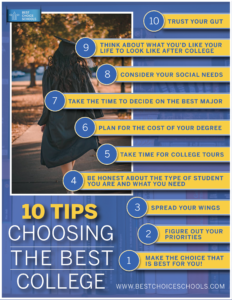
Choosing a college at which to spend the next four years is bound to be one of the most important decisions you’ll ever make. After all, college decisions affect so much! Where you choose to spend the next four years will determine things like lifelong friendships and even future career success. So if you thought picking the right college was simply finding the cheapest degree-granting institution or following your favorite college sports team, then we’ve got some important news for you — it’s not!
Of course, cost is very important when choosing the best college. The same can be said for a school’s location, reputation, and yes, even its sports teams and social scene. But what makes a college the best for one student doesn’t necessarily make it right for another. That’s why Best Choice Schools put together this list of our 10 best tips for choosing the best college. As you work through this helpful checklist, remember: college should be a wonderful time in your life, and doing the proper research will ensure that it is just that!
Table of Contents
1. Make the Choice that is Best for YOU!
Don’t follow in the footsteps of anyone, including your parents! There are many reasons to choose a college. There are also many reasons NOT to choose a college. These don’t-do-it reasons include following a high school boyfriend or girlfriend, following a die-hard sports fandom, or following the legacy of a parent of grandparent. If you’re tempted to choose a college because you feel the need to follow some one or some thing, don’t!
Picking the right college should be your choice, and based entirely on your own needs and interests, not someone else’s. A relationship that is meant to be will survive, it’s possible to root for more than one sports team, and we’re pretty sure your parents will find some room for a new bumper sticker on the back of the family car.
2. Figure Out Your Priorities
Before you even begin your search for the perfect college, you need to decide on your priorities for your college experience. Are academics first and foremost, or would you prefer less scholastic stress and more parties? Do you harbor dreams of being the coxswain of a collegiate rowing team? If so, you’ll want to limit your college search to the 39 colleges with rowing teams. Do you need a weekend hike in nature to help you focus and recharge? Then that urban college may not be the right fit. Know what you want and need from a college, and use those parameters to help you start a list of potential schools.
3. Spread Your Wings (But Only if You Really Want To)
Do you relish the thought of moving far, far away and living independently? Or does the thought of being a plane-ride away from your family make you feel a bit queasy? Before choosing a college, it’s worth taking a little time to reflect upon just how comfortable you would be living far away from mom and dad. If you’re thinking of a school out of state or on the opposite coast, imagine how you’ll feel missing Friday pizza night with the folks, or your little brother’s birthday party. Try to be honest with yourself. If seeing your family once or twice in nine months is okay with you, then far-away schools are definitely worth considering. If you’re a bit unsure, then consider those colleges out of state…but maybe check the average flight time and cost, too, to see if a weekend home might be possible now and again. And if the thought of being away absolutely terrifies you, then that’s okay, too. Simply keep your college search a little closer to home.
4. Be Honest About the Type of Student You Are, Then Analyze a College Through That Lens
We bet you know someone thinking of a college that would be totally, well, wrong for them. Sometimes it’s easier for us to recognize such a fact in others than it is to recognize it for ourselves. That’s why it’s worth taking some time to really be honest about the type of student you are, the type of young adult you are, and the types of things you’ll need to be a successful college student. If you need to, don’t be afraid to ask parents, close friends, or teachers their thoughts, too.
If you are the type of student who needs a small class in which to participate and ask questions in the moment, then a large university with its massive lecture auditoriums may not be the right place for you, regardless of how prestigious it is, or how dominant its football team. If, deep down, you are a bit concerned about just how much you enjoy alcohol, then do your best to steer clear of the big party school. Using some of the other tips on this list is a good place to start your research. Otherwise, sitting in on a class or two will give you a good idea of what to expect size wise, while admissions counselors and fellow students are great resources for finding out about other aspects of college life on a particular campus.
5. Take the Tour — but Get Off the Beaten Path, Too
The organized tour, usually given by a shining star of a current student, might just be a college’s best marketing tool. It’s thoughtfully designed to sell you on a product that just happens to cost thousands of dollars and at least four years of your life. Definitely take the tour, photograph the highlights, and ask questions…but don’t depend solely on the tour.
As you’re making plans to visit a potential college, plan to spend a little extra time exploring. Sit in on classes and visit popular hangouts where you can chat with current students who haven’t been given a “script” to follow. Go further by checking out social media groups dedicated to students or alumni of the college, or a school club in which you may be interested. If you know any alumni, talk to them, too. How do they feel about their alma mater now that they’ve graduated and have lived in the real world?
6. Know Exactly How Much Your Attendance Will Cost
As you start to narrow down your list of potential colleges, begin to figure out exactly how much it will cost you. It’s not easy for young adults to fully grasp the concept of money, so it’s important to realize that student loan debt is a huge commitment, and is likely to follow you around for decades.
Begin by using websites like College Navigator to find tuition costs, information about how much tuition is likely to rise, and the percentage of students who receive some form of financial aid. Then check out the college’s personalized cost calculator to figure out your proposed annual cost based on your individual needs. Once you know how much debt you’ll have come graduation day, you can research further. Explore the website PayScale to discover a college’s average Return On Investment (ROI). If a school is expected to cost you $249,000 over the course of four years, but has a 20-year net ROI of $1.123 million — as is the case with Massachusetts Institute of Technology — then more likely than not you will be able to comfortably repay any loans. If you already have an idea of future career, researching its ROI is also helpful.
Before taking out any student loans, be sure to include interest in your plans. Understand the conditions of all scholarships and grants you receive. Don’t be afraid to apply for merit scholarships. Finally, don’t delete private schools from your list because you assume they are more expensive. Because they are privately funded, private schools often have more in-house grants and scholarship opportunities for incoming students.
7. Don’t Just Settle on a Major. Choose Wisely.
Believe it or not, not every college offers a major in Canadian Studies or even Citrus and Horticultural Science. Some colleges don’t even offer a major in Political Science. Before you make that Instagram post on National College Decision Day, spend a little time researching a potential college’s list of offered degree programs. Even if you know a school offers your intended major, it’s worth taking some time to ensure the curriculum covers your interests, and that your intended concentration is also offered. A Biology degree program at one school may look very different from a Biology program at another. Finally, don’t choose a college only because they specialize in your intended major. According to the National Center for Education Statistics, about 80% of college students in the U.S. change their major at least once.
8. Consider Your Social Needs
One of the biggest factors of overall college happiness is one’s social scene. While no student body will be exactly like you, it does help to know whether or not you’ll be surrounded by those who share similar values, interests, and beliefs. So before you sign on the dotted line, definitely do a little research into a college’s student body.
Do you know anyone else attending the college in question (and do you like them)? Are there any campus clubs or organizations that fit your interests, and that you would be interested in joining? How many roommates would you be expected to have, and how are roommates determined? While some colleges pair roommates randomly, others take into account shared interests. Finally, use a website like The Princeton Review to check out some of the school’s demographics. For example, if you’re very politically Liberal, then a politically Conservative college probably won’t be the best fit. If you are keen to be around fellow Christians, then a college with a largely atheistic student body might be worth crossing off the list.
9. Keep Postgrad Life in Mind
While a college is so much more than its reputation or ranking, it is important to consider a potential school’s role in your future. If you already have a career or company in mind, spend a little time researching the schools that most often feed into them. For any school you’re considering, find out if there is a career services center, work study program, internship program, or strong alumni networks. All of these things can be extremely helpful when it comes time to finding a job after graduation. Still, it’s worth repeating: don’t rely solely on a college’s reputation. Just because a school is highly ranked or considered to be prestigious does not mean it is the right fit for you.
10. Trust Your Gut
Finally, and maybe even most importantly, trust your gut. Chances are, everyone from your mom to your geometry teacher is going to have an opinion about where you should go to college. As persuasive as such folks may be, it’s important to remember that your college experience is yours and no one else’s. Only you know what you’re looking for in a college. Only you know how it is you envision your future. Only you can tell which school truly feels right to you. And remember: if things don’t work out and you’re really unhappy, you can always transfer!
It bears repeating: the four years you spend as an undergraduate in college are meant to be some of the best you’ll ever have. In such a short time — a blip in the grand scheme — you’ll form lifelong friendships, make more mistakes than you’ll ever care to admit, and grow into an adult. But where you spend those four years is a huge decision, one that is worth researching, and questioning, and then questioning some more. Above, we listed our top ten best tips for making the momentous college decision. We hope you’ll find them helpful as you ask yourself, “How do I choose the best college for me?”
Related Articles:
30 Small College Towns with Great Quality of Life
15 Best Subscription Boxes for College Freshmen
30 Most Beautiful Universities in Canada
How Will I Be Able to Know if I Can Afford the College I Am Interested In?










